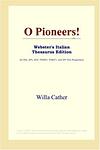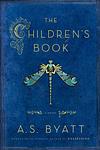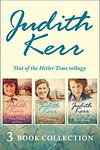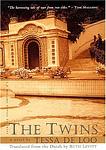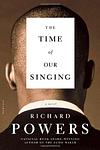The Greatest "Family, Germany" Books of All Time
Click to learn how this list is calculated.
This list represents a comprehensive and trusted collection of the greatest books. Developed through a specialized algorithm, it brings together 300 'best of' book lists to form a definitive guide to the world's most acclaimed books. For those interested in how these books are chosen, additional details can be found on the rankings page.
Genres
The "Family" category of books encompasses stories that revolve around the dynamics, relationships, and experiences of families. These books explore the complexities of familial bonds, including love, loyalty, conflict, and forgiveness. They may focus on different types of families, such as nuclear families, blended families, or extended families, and may cover a range of themes, from coming-of-age tales to domestic dramas. Overall, the "Family" category offers a rich and diverse collection of books that delve into the joys and challenges of family life.
The category of "Germany" in terms of books would encompass literature that is set in or about Germany, its history, culture, people, and society. This could include works of fiction, non-fiction, memoirs, biographies, and historical accounts that explore various aspects of German life, such as the country's politics, economy, art, music, literature, and more. The category would be of interest to readers who are fascinated by Germany's rich and complex history, its contributions to world culture, and its ongoing role in shaping global affairs.
Countries
Date Range
Reading Statistics
Click the button below to see how many of these books you've read!
Download
If you're interested in downloading this list as a CSV file for use in a spreadsheet application, you can easily do so by clicking the button below. Please note that to ensure a manageable file size and faster download, the CSV will include details for only the first 500 books.
Download-
1. Buddenbrooks by Thomas Mann
"Buddenbrooks" is a novel that chronicles the decline of a wealthy north German merchant family over the course of four generations. The narrative focuses on the fluctuating fortunes and internal struggles of the family, reflecting the societal changes and economic decline of the period. The family's personal and business relationships, their moral values, and their struggle to maintain social status are all explored against the backdrop of the changing political and social landscape.
-
2. Silas Marner by George Eliot
Silas Marner, a weaver, is wrongfully accused of theft and excommunicated from his community in Lantern Yard. He moves to the village of Raveloe, where he lives as a recluse, hoarding his money. After his money is stolen, he adopts a young girl named Eppie, who was abandoned near his home. Eppie's presence transforms Silas's life, and he becomes a cherished member of the community. The novel explores themes of betrayal, redemption, and the transformative power of love.
-
3. Independent People by Halldor Laxness
"Independent People" is a novel set in rural Iceland, following the life of a stubborn sheep farmer who values his independence above all else. Despite facing numerous hardships, including poverty, harsh weather, and family strife, he refuses to accept help or compromise his self-reliance. The book explores themes of pride, the struggle for survival, and the human spirit's resilience in the face of adversity.
-
4. The House of the Seven Gables by Nathaniel Hawthorne
This novel revolves around the cursed Pyncheon family, who live in a gloomy New England mansion, cursed due to the actions of their ancestor who had an innocent man hanged as a witch to seize his property. The story explores themes of guilt, retribution, and atonement, and the narrative is interspersed with the author's philosophical musings. The present-day Pyncheons include an old maid, a daguerreotypist, and their elderly, reclusive cousin who returns to the house after a mysterious absence of many years.
-
5. So Long a Letter by Mariama Bâ
"So Long a Letter" is an epistolary novel that explores the life of a recently widowed woman in Senegal. Throughout the story, she reflects on her life, her marriage, her husband's second, younger wife, and the status of women in Senegalese society. The book delves into themes of polygamy, friendship, and the struggle for women's rights in a predominantly patriarchal society. It is a poignant examination of the personal and cultural conflicts faced by women in post-colonial Africa.
-
6. The Plot Against America by Philip Roth
This novel presents an alternate history where aviator-hero and rabid isolationist Charles Lindbergh is elected President in 1940, leading the United States towards fascism and anti-Semitism. The story is narrated through the perspective of a working-class Jewish family in Newark, New Jersey, experiencing the political shift and its terrifying consequences. The narrative explores themes of prejudice, fear, patriotism, and family bonds under the shadow of a fascist regime.
-
7. O Pioneers! by Willa Cather
"O Pioneers!" is a novel about a Swedish-American immigrant family's struggles and successes in the great plains during the late 19th century. The story centers on the family's eldest daughter, who inherits the family farm and devotes her life to making it thrive despite the hardships of weather, personal loss, and societal expectations. The novel explores themes of love, gender, land ownership, and the harsh realities of frontier life.
-
8. A Legacy by Sybille Bedford
"A Legacy" is a historical novel that captures the social and political turmoil of early 20th century Germany through the eyes of its protagonist. The story follows a young woman who hails from two distinct families, one being a wealthy Jewish family from Berlin and the other, an aristocratic Catholic family from rural Germany. The narrative provides a detailed account of the protagonist's life, her family's eccentricities, and the eventual downfall of her families amidst the backdrop of the First World War and the Weimar Republic.
-
9. The German Lesson by Siegfried Lenz
"The German Lesson" is a vivid exploration of the moral and cultural conflicts of World War II, set in a small German village. The story is narrated by a young boy who is tasked by his school teacher with an assignment to write an essay on "The Joys of Duty." As his father, a local police officer, is assigned the duty of preventing a popular local artist from painting, the boy finds himself torn between his father's rigid adherence to duty and his own growing appreciation for art and individual expression. The narrative grapples with themes of duty, obedience, and the power of art, providing a thoughtful examination of life under the Nazi regime.
-
10. All the Light We Cannot See by Anthony Doerr
Set during the turmoil of World War II, the novel follows the intersecting lives of a blind French girl and a German boy. The girl, living in occupied France, seeks solace in the world of books and the imagination, while the boy, a member of Hitler Youth, is a radio operator for the German forces. Their paths cross in the walled city of Saint-Malo, with the narrative exploring themes of survival, morality, and the human spirit.
-
11. The Children's Book by A. S. Byatt
"The Children's Book" is a historical novel that explores the lives of several families, primarily the Wellwoods, from the end of the Victorian era through World War I. The story delves into the complex relationships between parents and children, the influence of storytelling, and the impact of political and social changes on personal lives. It also portrays the struggles of women's suffrage, socialism, and the arts and crafts movement. The narrative is intricately woven with fairy tales and myths, reflecting the characters' inner lives and the era's cultural milieu.
-
12. When Hitler Stole Pink Rabbit by Judith Kerr
"When Hitler Stole Pink Rabbit" is a poignant and autobiographical novel that follows the life of a young Jewish girl named Anna and her family as they flee Germany in the 1930s to escape the rise of the Nazi regime. Through Anna's eyes, the book explores the challenges and hardships faced by refugees, as well as the loss of identity and sense of belonging. It is a touching story of resilience, courage, and the power of family bonds in the face of adversity.
-
13. The Twins by Tessa De Loo
"The Twins" is a poignant narrative about twin sisters, separated at a young age due to the Second World War. One sister grows up in the Netherlands under Nazi occupation, while the other is raised in Germany as part of the Hitler Youth. After six decades of separation, they meet again and begin to share their experiences, discovering the impact of the war on their lives and the stark differences in their upbringing. The book explores themes of identity, loyalty, and the long-lasting effects of war on individuals and families.
-
14. The Time of Our Singing by Richard Powers
"The Time of Our Singing" is a complex narrative that follows the lives of a mixed-race family in America from the 1930s to the 1990s. The family, born from the union of a black woman and a Jewish man, grapples with racial identity, familial bonds, and the power of music. The story is told through the perspective of one of the sons, a talented singer, and delves into themes of race, identity, and the struggle for civil rights in America.
-
15. Floating In My Mother's Palm by Ursula Hegi
The book is a poignant coming-of-age story set in a post-war German town, where a young girl navigates the complexities of her family life and the secrets of her community. Through her eyes, readers experience her relationships with colorful local characters, her discovery of love and loss, and her quest for identity amidst the lingering shadows of World War II. The narrative is a tapestry of small-town life, capturing the essence of growth and the bittersweet nature of memory, as the protagonist learns about the resilience of the human spirit and the fluidity of time, much like floating in the comforting yet unpredictable embrace of her mother's palm.
-
16. The Blind Side of the Heart by Julia Franck
"The Blind Side of the Heart" is a historical novel that explores the life of a German woman before, during, and after World War II. The story begins with her abandonment of her young son at a railway station, then flashes back to her own childhood, her experiences during the war, and her tumultuous relationships. The narrative provides a deep and unflinching look at the psychological effects of war and the struggle for survival, as well as the profound impact of trauma and loss.
-
17. The Eighth Life by Nino Haratishvili
"The Eighth Life" is an epic family saga that spans over a century, tracing the lives of a Georgian family through the tumultuous history of the Soviet Union. Beginning with the story of a young woman who escapes the Bolshevik Revolution, the novel delves into the lives of subsequent generations as they navigate through love, loss, and the enduring legacy of their family. With richly drawn characters and a captivating narrative, this book explores themes of identity, sacrifice, and the power of storytelling.
Reading Statistics
Click the button below to see how many of these books you've read!
Download
If you're interested in downloading this list as a CSV file for use in a spreadsheet application, you can easily do so by clicking the button below. Please note that to ensure a manageable file size and faster download, the CSV will include details for only the first 500 books.
Download





